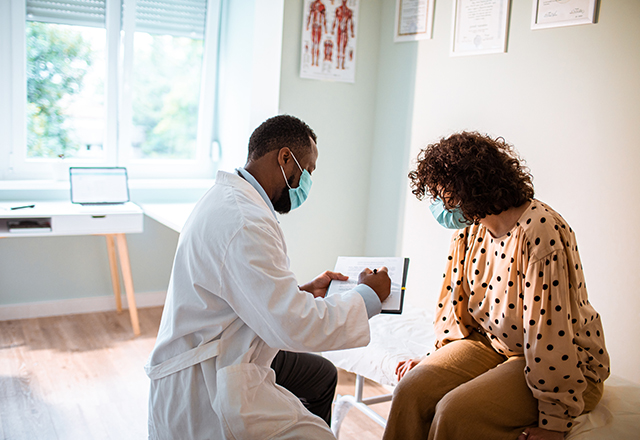On a mid-July morning, several months deep into pandemic-induced social isolation, two text notifications rang out from my phone: “Out for review!!!” and “PET scan Monday.” During a single day in quarantine, my first-author paper had moved forward to peer review at a well-respected journal, and my father’s emergency positron emission tomography (PET) scan was scheduled. It was the epitome of bittersweet news. Many aspects of juggling life during a global pandemic have felt like emotional whiplash. But for people with cancer, COVID-19 has not only disrupted their lives but has resulted in a suboptimal standard of care.
Across many countries, the burden of COVID-19 on health care systems quickly led to a diversion of resources and suspension of cancer screening programs. In the United States, the Centers for Medicare & Medicaid Services, a federal agency that administers health care coverage for Americans over age 65, deemed cancer screening a low-priority service1. In addition, many people are not seeking health care visits due to fear of exposure to SARS-CoV-2. One survey indicated that nearly 60% of clinical oncology investigators reported that the pandemic had a moderate or high impact on patient visits, resulting in delays or cancellations2. Overall, this has resulted in a notable decrease in the number of cancer screenings and diagnoses since the pandemic began3.
In terms of the virus itself, not everyone is affected equally. Several studies have observed that patients with cancer have an increased risk of severe illness and mortality from SARS-CoV-2 infection. An early study from China found that people with cancer had a 6% mortality rate — twice that of the country’s total COVID-19 mortality rate4. More recently, in New York City, a study of 218 cancer patients found a staggering 28% case-fatality rate5 compared to the 4.1% overall mortality rate in the United States, according to Johns Hopkins6. To further complicate matters, cancer treatment (including surgery, radiation, chemotherapy and potentially immunotherapy) may be associated with worse COVID-19 outcomes. This suggests that cancer patients are stuck between a rock and a hard place — deciding whether to seek the necessary treatment to fight their disease when it may put them at a higher risk of death from COVID-19. The pandemic has also caused many clinical trials to grind to a halt, obstructing a valuable avenue of therapy options for patients7.
There have been a multitude of uncertainties thus far during the pandemic, but one thing is clear: COVID-19 will have a dramatic effect on cancer outcomes around the world. Withholding cancer treatment from patients may result in an increase in cancer mortality, possibly surpassing the virus itself. In order to bring together health care providers, clinicians and patients to address these issues, major organizations such as the American Association for Cancer Research have held special symposiums on COVID-19 and cancer, including an entire conference centered around this topic in July. We don’t know how long the pandemic will last. Hopefully, insights gleaned from these think tanks will help lessen the burden of COVID-19 on cancer patients.
“I have no idea what’s awaiting me, or what will happen when this all ends. For the moment I know this: there are sick people and they need curing.”
― Albert Camus, The Plague
References:
- https://www.cms.gov/files/document/cms-non-emergent-elective-medical-recommendations.pdf
- https://www.nature.com/articles/d41573-020-00093-1
- https://ehrn.org/wp-content/uploads/Preventive-Cancer-Screenings-during-COVID-19-Pandemic.pdf
- http://weekly.chinacdc.cn/en/article/id/e53946e2-c6c4-41e9-9a9b-fea8db1a8f51
- https://cancerdiscovery.aacrjournals.org/content/candisc/early/2020/04/29/2159-8290.CD-20-0516.full.pdf
- https://coronavirus.jhu.edu/data/mortality
- https://www.nature.com/articles/d41573-020-00093-1
Related content
- Chasing Cancer: How the COVID-19 Pandemic Affects Cancer Outcomes
- Psychiatric Perspectives in an Era of COVID-19
- ADHD in a Pandemic
Want to read more from the Johns Hopkins School of Medicine? Subscribe to the Biomedical Odyssey blog and receive new posts directly in your inbox.

Pingback: Next Generation Cancer Diagnostics Revolutionize Patient Care – Biomedical Odyssey
Pingback: Oncology: Offering Hope to Patients in Need – Biomedical Odyssey
Comments are closed.